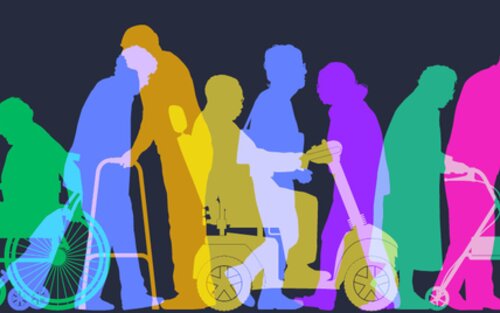Inequality Among Persons With Disabilities in Kenya Intensified by COVID-19
National Gender and Equality Commission (NGEC) Chair Dr. Joyce Mutinda who says the virus has intensified the levels of inequalities in the Kenyan society, particularly for Persons With Disabilities

Covid 19 and Disability (John Hopkins Bloomberg School of Public Health )
COVID-19 has intensified the levels of inequalities in the Kenyan society, particularly for Persons With Disabilities. This is according to National Gender and Equality Commission (NGEC) Chair Dr. Joyce Mutinda who says the virus has left persons with disabilities disproportionately affected.
Dr. Joyce says the persons with disabilities, who amount to approximately 0.9 million in Kenya, are among the most vulnerable populations in the country. According to the Doctor, persons with disabilities in Kenya are more likely to suffer opportunistic infections, lack employment, lack adequate livelihood opportunities, live in precarious conditions, and normally dependent on their families and community for their living.
“While the COVID-19 pandemic exhibits general negative effects on all segments of the society, persons with disabilities are much disproportionately affected,” she says on behalf on the commission. In her opinion, Dr. Mutinda says this mainly has to do with attitudinal, environmental, and institutional barriers that are reproduced in the COVID-19 responses.
Already, many persons with disabilities have pre-existing health conditions that make them more susceptible to contracting the coronavirus disease. They experience more severe symptoms upon infection, leading to elevated probabilities of death. Research conducted earlier this year by Stony Brook University in New York found that Persons with Intellectual or Developmental Disability are at high risk of succumbing to COVID-19.
According to the database used in the research, coronavirus claimed the lives of just 3 percent of patients aged between 18 and 74 who did not have an intellectual or developmental disability, compared to 4.5 percent of intellectual or developmental disability patients.
The commission says it anticipates the effects and impact of the second wave of the virus to remain disproportionately harsh amongst most vulnerable groups within the persons with disability community. These include women with disabilities, older members of societies with disabilities, children with disabilities, persons with disabilities living in the informal and unplanned settlements, and persons with disabilities without any form of income or social protection.
The Commission has called onto the National and County Governments to plan, finance and execute innovative programs that directly protect the vulnerable persons with disabilities from extreme consequences of COVID-19.
These include post-COVID-19 recovery plans as well as increase reach and coverage of persons with disabilities with cash transfers especially during times of COVID-19. “Further, persons with disabilities should be involved and extensively consulted in the design and execution of such interventions. They too have contributions to make. This will help manage and build emotional resilience while ensuring that persons with disabilities get the right support, at the right time and in the right settings,” Dr. Mutinda said.
As of Dec 3, Kenya has reported 86,383 cases of the coronavirus, including 1,500 fatalities.
Dr. Mutinda spoke when Kenya joined the rest of the world to observe the International Day of Persons with Disabilities.
The annual observance of the International Day of Persons With Disabilities was proclaimed in 1992 by United Nations General Assembly under Resolution 47/3. The day seeks to promote the full and equal participation of persons with disabilities and urge the Member States to take action for the inclusion of persons with disabilities in all aspects of society and development.
The 2020 International Day of Persons With Disabilities theme is “Building Back Better: toward a disability-inclusive, accessible and sustainable post-COVID-19 World”.
Margaret Njuguna
